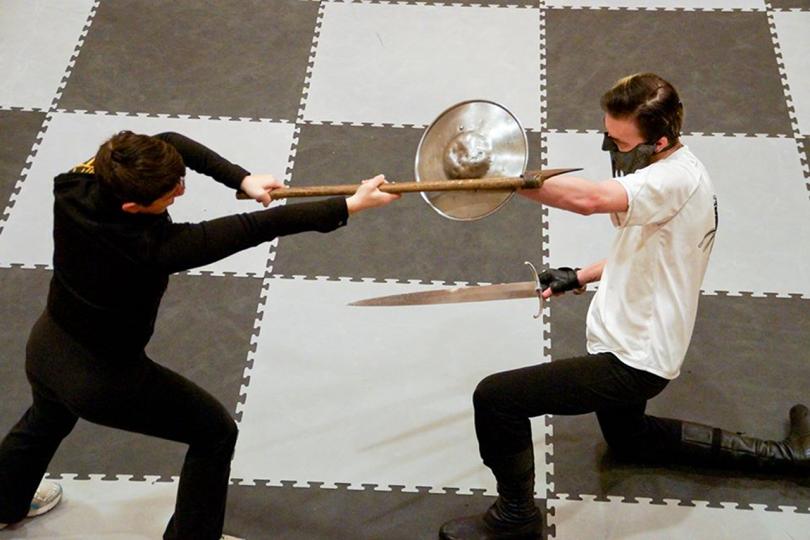Fighting for better fighting

“It’s actor training. It makes you a better actor . . . What makes a good fight good is seeing a character struggling to overcome an obstacle in pursuit of their objective. Which, in the grand scheme, is drama. [A well-trained stage combatant] can physically express their character even in the minutiae of their pointwork and their bladework.” –Mike Lubke
Every actor in the industry knows that great work happens on a foundation of training.
What is not as clear is what exactly that training ought to look like. Cue a seemingly endless deluge of advice aimed at artists: actors should take dance lessons, actors should take voice lessons, actors should do stage crew, ad infinitum. And then, there’s stage combat.
Stage Combat is not that piece of short sword choreography you learned that one time you played Tybalt and then forgot. Many, many articles already exist pleading with artists to take stage combat classes outside of rehearsal. Actors, they explain, learn safety, timing, reactivity, body awareness, and how to better physicalize stakes; directors and stage managers can learn a vocabulary to achieve safer and flashier stage violence.
For all that, though, learning to throw a fake punch can feel auxiliary. How can so specific a skill set be foundational?
The Twin Cities stage combat community is in a unique position to answer. Ten years ago, the community’s foundations were falling away, and it very nearly disappeared completely. Today, it is strong and stable.
The new and present strength of the community is a boon for all storymakers, and a reminder of what serious training can look like for those in the arts.
In the Past, a Fragmented Stage Combat Community
The de facto homes for stage combat in the 1990s and 2000s were two St. Paul fight schools, Michael Anderson’s EnGarde! Unlimited (active in the early and mid-90s) and Don Preston’s They Fight! (active in the early 00s). During this time the students’ primary performance outlet was the Minnesota Renaissance Festival via Dayna Jean Wolter’s Cappa Ferro Productions.
The show was “Human Combat Chess,” a tongue-in-cheek, fictionalized “sporting event” that exhibited fights between the Twin Cities’ best-trained stage combatants.
The Renaissance Festival, however, became increasingly unable to serve as a major platform for combat performance: demand remained high, but the long rehearsal periods necessary for quality and safety presented significant financial and logistical difficulties for Festival administrators. Faced with mounting costs, “Human Combat Chess” performed for the final time at the 2005 Festival.
The loss of a major performance venue motivated a dispersal of the community. The final nail in the coffin, though, was Minnesota’s growing lack of training opportunities. Anderson suffered a traffic accident and was forced into what he calls an “extended sabbatical,” and Preston, increasingly unable to offer consistent classes, moved to England in 2007.
This dearth of teachers was also evident in the notable absence of institutional training routes. The Society for American Fight Directors (SAFD), for instance, is a national organization that offers classes for training and certification; taking a class from a certified teacher means a chance to qualify for combatant certification.
It’s not quite fair to say that connections to the SAFD are the end-all be-all of stage combat training; other organizations offer proficiency and instructor certification (local Annie Enneking, for example, is an Associate Instructor with Dueling Arts International), and one need not have full SAFD teacher certification to find success as a reputable, high-quality freelance choreographer. Peter Moore and Doug Scholz-Carlson are two prominent Minnesotan examples. Likewise, an actor by no means needs combatant certification to get stage combat work.
Nevertheless, SAFD is the organization behind the nation’s highest profile regional workshops, and the vast majority of professional combatants and choreographers are connected to it in some way.
Throughout most of the 2000s the Twin Cities had only one SAFD certified teacher (Preston). From 2007 to 2011, there were zero SAFD certified teachers in the Twin Cities. Students looking for classes were forced to look out of state.
Now, a Revival
Enter St. Paul high schooler Mike Lubke. Cast as Laertes in Hamlet, he was taught his first fight by a freelancing Don Preston. Lubke worked and trained with Preston several more times over the next few years. At the University of Minnesota B.A. program, Lubke lobbied the administration for B.A. access to the B.F.A. stage combat class. His “pitching a fit” was successful: Peter Moore taught the first non-B.F.A. stage combat class in 2008.
For his capstone project, Lubke decided on a recognizable show: Human Combat Chess. At that point (2009), the concept had been untouched for four years. In retrospect, this show was crucial to the revival of the community. For one, “Human Combat Chess” would go on to become a recurring event, a (mostly) annual performance opportunity that stage combat enthusiasts could count on.
Perhaps more importantly, in his preparation for the project Lubke attended a number of Midwestern regional workshops: Chicago’s Winter Wonderland (“the largest regional stage combat workshop in the United States”) and Des Moines’ Carnage in the Corn.
It was at these workshops that Lubke began to meet other performers who lived in the Twin Cities but who rarely had the opportunity to practice or perform in Minnesota. These connections were the first steps toward a rekindled community, and SAFD-sanctioned regional workshops made these connections possible: “Once we started getting more and more local interest in the Twin Cities about training in stage combat,” said Lubke, “Carnage [in the Corn] was the place we went as a group. […] After two or three years, Carnage population was probably 70% people from the Twin Cities.”
In 2011 the second “Human Combat Chess” show went up, this time under the newly formed Six Elements Theatre. This second time around, the show drew more attention and brought a wider array of people on board.
Around the same time, Michael Anderson, back from his “sabbatical,” began consistently offering certification classes.
Finally, Lubke relaunched the Minnesota Stage Combat Open Gym, offering a semi-regular space for “exploration and refinement of the craft.” They Fight! student Brian Hesser originated the open gym a few years previously but it was plagued by inconsistent attendance. With more reasons to practice and more opportunities for local and regional training, this time the idea stuck.
A Self-Sustaining Community
Over the next few years the number of people actively practicing stage combat continued to grow, coalescing into a true community.
Two final factors cemented the Twin Cities as a site for stage combat. In June of 2015, three Twin Cities choreographers achieved SAFD teacher certification—Mike Lubke, Aaron Preusse, and Amie Root—raising the number of certified teachers from one (just Michael Anderson) to four. And Minneapolis is now home to a regional workshop of its own: The Brawl of America, three years old as of May 2016. Brawl provides local students a chance to work with non-local fight masters and connect with combatants outside Minnesota.
It will come as no surprise that Mike Lubke was a co-founder of Brawl of America.
Lubke is quick to point out that his three most significant contributions to the community—a recurring practice space (open gym, still running), a recurring performance opportunity (Human Combat Chess), and a regional workshop (Brawl of America)—were all communal efforts and based on previous work.
“Any time that I have found success in stage combat or in the coalescing of the community,” he said, “has been very much a standing on the shoulders of giants kind of thing.”
--------
Editor's Note: Auditions for Human Combat Chess will take place January 26-28.




